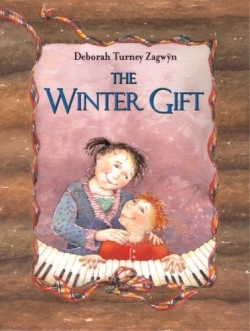The Winter Gift
All that was left in Grandma’s house was her big brown piano and its bench. Clee’s family had always spent Christmas at Grandma’s but there would be no more family Christmases at Grandma’s with all the wonderful cooking smells, the music and the house full of people. Grandma would no longer sit at the piano and play, Clee’s younger brother Simon would no longer pound notes on the piano for the storm outside or the icicles melting. Grandma was moving and there was no room for the piano in her new apartment.
Now they were waiting for a gentleman to arrive who wanted to buy the piano. The grumbling old man said the ivory keys were chipped, the piano was very old, and he didn’t want an upright piano that probably wouldn’t hold a tune. Grandma sat down at the piano and began to play. The music swirled around her like “a ribbon of sound.” She looked at the faces of her grandchildren, turned to the man and said, “The piano isn’t for sale.” That night Clee, Simon, and Grandma slept near the piano in Grandma’s empty house.
Christmas came to Clee’s house but it wasn’t the same as Grandma’s old house. Uncle Fishtank Hal arrived and entertained the family with songs and dances. It wasn’t the same without the old brown piano. Christmas morning there were presents under the tree for everyone but the best present of all was Grandma’s old brown piano that had mysteriously appeared. Grandma played while the family created a song about Christmas morning. A new family tradition had begun.
Zagwyn is the author of six other books for children including The Pumpkin Blanket, Turtle Spring, and Apple Batter all featuring Clee. The Winter Gift is a quiet story about family traditions and the importance of music in people’s lives. The bright watercolor illustrations add to the story showing details not included in the prose. The ribbon theme is carried out through the book with various colors as borders on each page. One can feel the warmth and love of the family in the faces of the characters.
Families should enjoy reading this aloud especially during the holidays and perhaps trying to play the music and sing the words to “A’Soalin,” which is reproduced at the end of the book.
Reviewed by
Diane Pozar
Disclosure: This article is not an endorsement, but a review. The publisher of this book provided free copies of the book to have their book reviewed by a professional reviewer. No fee was paid by the publisher for this review. Foreword Reviews only recommends books that we love. Foreword Magazine, Inc. is disclosing this in accordance with the Federal Trade Commission’s 16 CFR, Part 255.

